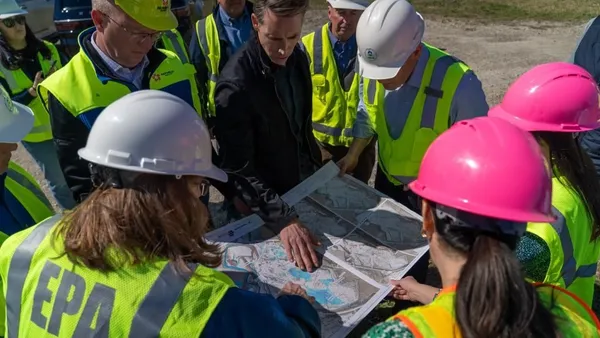UPDATE: April 2, 2019: The Sunny Farms Landfill has requested a hearing about a recent notice of intent to deny its license. The Advertiser-Tribune reports a date has not been set yet, but discussions are underway between each party's attorneys.
Sunny Farms has reportedly installed 18 new gas extraction wells and three new permanent air monitors to detect hydrogen sulfide, with plans for further infrastructure updates in April. The company also purchased 180 new acres next to the site to use for soil and serve as a buffer area.
UPDATE: March 1, 2019: The Seneca County General Health District voted unanimously at a highly attended Feb. 28 meeting to approve a notice of intent to deny a license renewal for Sunny Farms Landfill in Fostoria, Ohio.
“We’re very disappointed in the board’s actions," Matthew Neely, senior vice president of Tunnel Hill Partners, told the Toledo Blade, noting capital investments at the site. “We are very confident that these improvements will take effect and be very readily apparent over the coming weeks and months."
Tunnel Hill now has 30 days to request a hearing with the county to make a case for license renewal.
Dive Brief:
- Earlier this month, the Ohio Environmental Protection Agency announced an enforcement action over ongoing odor issues at the Sunny Farms Landfill that require multiple mitigation steps. Soon after, three area residents filed a $4 million lawsuit against the site's owner, according to the The Advertiser-Tribune.
- Owner Tunnel Hill Partners responded in its own Feb. 8 editorial, outlining the initial success of new equipment designed to reduce hydrogen sulfide levels at multiple stages, along with other upgrades. "We are committed to running Sunny Farms Landfill in a way that serves the best interests of the community," wrote CEO John Lamanna.
- So far, two local governments have voted against renewing the site's expired operating license. Both votes were non-binding formalities, and the Seneca County General Health District will have a decisive say next week. According to the Ohio EPA, as reported by WTOL, the landfill could potentially be forced to close if a license isn't approved and an appeal is unsuccessful.
Dive Insight:
The Sunny Farms Landfill is experiencing a tumultuous start to the year amid a pivotal time for its owner. As first reported by Waste Dive, Tunnel Hill was officially acquired by a Macquarie Infrastructure Partners fund earlier this month. Both parties declined to comment on the transaction, so it's unclear if these developments complicated negotiations in any way.
The fate of this site is especially critical, as it's one of just two owned by the company. Per the enforcement action, as well as Lamanna's editorial, Tunnel Hill is in the process of making multiple changes to improve operations at Sunny Farms. These changes include additional wells and pipes to collect gas for flaring, steel vaults to "trap" hydrogen sulfide pre-flaring, a pilot water filtration system for hydrogen sulfide that could eventually expand into a full treatment plant, new cover techniques, a reduced working face, new air monitors and a community complaint hotline.
Tunnel Hill's business model is designed in part on a robust rail and truck transfer network that can source waste from throughout the Northeast (where disposal capacity is more constrained) and bring it to sites in Ohio with relatively abundant capacity.
As just one example of how wide that sourcing network is, a new report from the Massachusetts Department of Environmental Protection shows Sunny Farms took 16% of the state's C&D material between 2015-2017. According to the latest Ohio EPA data, C&D material comprised a majority of the nearly 1.54 million tons of waste accepted by Sunny Farms in 2017.
Relative to other states, Ohio is often described as a more favorable environment for landfill operators in terms of its regulatory and business climate. However, the recent wave of attention at Sunny Farms could indicate that this is starting to change.















